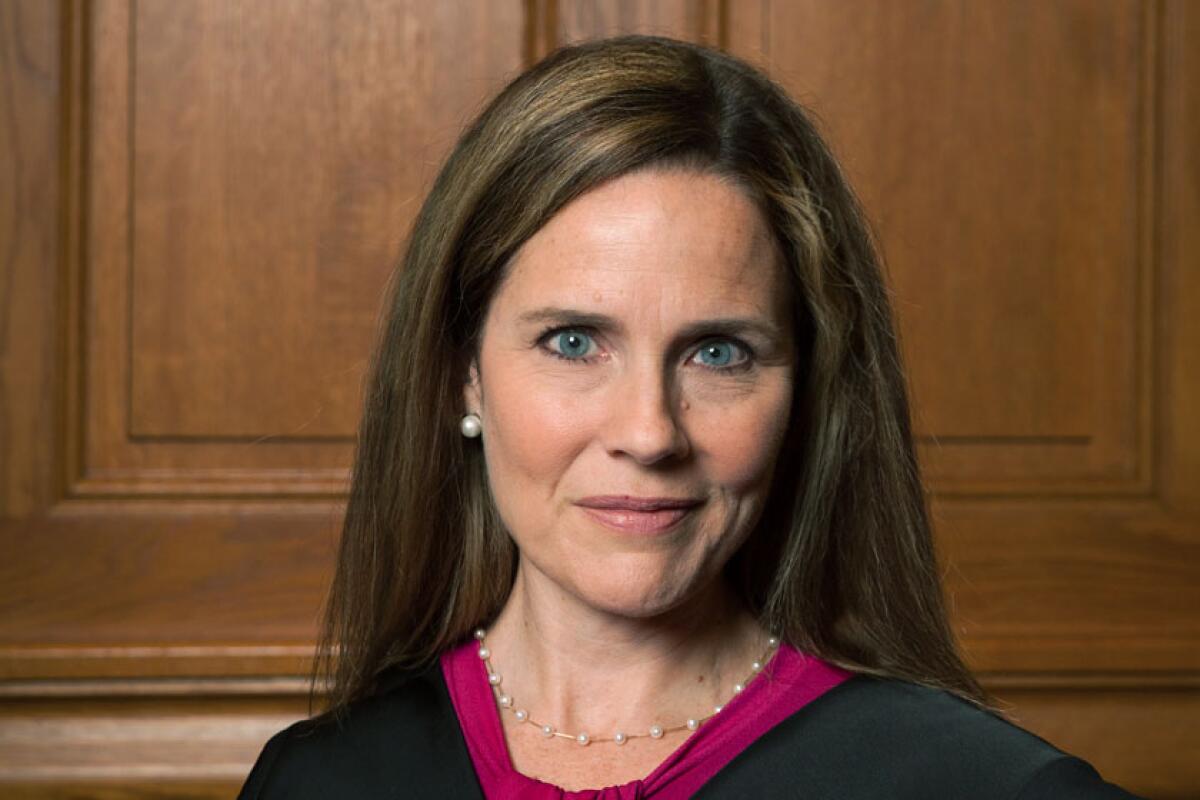Amy Coney Barrett will tell senators laws should be applied as written, not as judges would like

- Share via
WASHINGTON — Supreme Court nominee Amy Coney Barrett, whose confirmation hearings begin Monday, will tell the Senate Judiciary Committee that “policy decisions and value judgments” should be made by elected officials, not the courts, according to her opening statement released Sunday.
The 48-year-old federal appeals court judge, whose ascension to the high court would cement a conservative majority, also will pay tribute to Justice Ruth Bader Ginsburg, a legal icon whose death last month created the court vacancy she has been nominated to fill, and to Barrett’s mentor, Justice Antonin Scalia, according to the prepared remarks.
The confirmation hearings come against a tumultuous backdrop: the final weeks of a bitterly fought presidential campaign, which has been roiled by President Trump’s bout with the coronavirus and his claims that a COVID-19 outbreak that has killed more than 214,000 Americans will soon disappear.
Barrett’s nomination has become a contentious campaign issue, both because Democrats are outraged by the Republican push to confirm her even after voting in the presidential election has begun in many states, and because Trump’s rival, Joe Biden, warns that Barrett will side with conservative efforts to gut the Affordable Care Act, or Obamacare.
And Trump has repeatedly made clear in public statements that he is mindful of the fact that the court could be called upon to play a role in a messy, contested election result.
Barrett’s opening statement appeared carefully crafted to emphasize her respect for precedent and settled law while skirting direct commentary on broad social issues. The courts are “not designed to solve every problem or right every wrong in our public life,” the judge’s statement says.
“The policy decisions and value judgments of government must be made by the political branches elected by and accountable to the people,” Barrett says in the statement. “The public should not expect courts to do so, and courts should not try.”
Democrats, who have no real prospects for blocking the nomination, have expressed deep skepticism about Barrett’s willingness to abide by legal precedent.
“Her views on reaching back and reconsidering and overturning long-settled precedent are not just extreme, they’re disqualifying,” said Sen. Chris Coons (D-Del.), who is a member of the Judiciary Committee. Barrett’s views, he said on “Fox News Sunday,” “make her not qualified to serve on the Supreme Court.”
Echoing the view of many Democrats, Coons said he believed Barrett was chosen because Trump was confident she would vote to dismantle Obamacare and restrict abortion rights.
“I think she’s made that very clear in recent writings,” he said.
On the Republican side, Sen. Ben Sasse of Nebraska, also a member of the committee and also interviewed on Fox, dodged questions as to whether her supporters hoped Barrett would back efforts to overturn or weaken the landmark 1973 Roe vs. Wade decision, which affirmed the constitutional right to safe and legal abortion.
If Barrett were seeking elected office, Sasse said, “she would have policy positions that she’d lay out to the American people. That isn’t what a judge’s job is.”
In her opening remarks Monday, Barrett, a mother of seven, will speak extensively about her husband and children. Trump has frequently expressed delight over the fact that his nominee has young children.
“I am used to being in a group of nine — my family,” Barrett says in the statement. “Nothing is more important to me, and I am so proud to have them behind me.”
The four days of hearings will begin with her opening statement, with hours of questioning on Tuesday and Wednesday by interlocutors on the Judiciary Committee, who will include Biden’s running mate, California Sen. Kamala Harris.
Harris intends to participate remotely from her Senate office because of coronavirus concerns, her office indicated. Two Republicans on the committee recently tested positive for COVID-19.
In advance of the hearings, Republicans have sought to portray Democrats as hostile to Barrett’s religious beliefs. The judge, who describes herself as a Catholic, has had a long affiliation with a conservative Christian faith community called People of Praise, which adheres to traditional gender roles and spurns openly gay men and women.
Democrats telegraphed that they would tread very carefully on the subject of Barrett’s faith.
“Her religion is immaterial, irrelevant,” Sen. Mazie Hirono of Hawaii, a Judiciary Committee Democrat, said on CNN’s “State of the Union.”
Although Trump and many Republicans hope that the prospect of filling another court seat will energize his base and turn campaign attention away from the rising coronavirus caseload, the narrative of her nomination has become entangled with that of the pandemic.
A Sept. 26 White House celebration of Barrett’s nomination, which was attended by many senior GOP officials and featured almost no adherence to mask-wearing or social distancing, has been described by the government’s top infectious-disease expert, Dr. Anthony Fauci, as a “superspreader event.”
Trump, who came down with COVID-19 symptoms days later and spent last weekend hospitalized at Walter Reed National Military Medical Center, plans to resume campaign events this week. His doctors say he is no longer contagious but have not disclosed any negative coronavirus test.
The 74-year-old president, who has repeatedly described himself as now being immune, said Sunday he was not suffering any lingering effects. The degree of immunity for recovered patients is still being studied by scientists.
“I feel fantastically. I really feel good,” Trump said on “Sunday Morning Futures,” the latest in a string of phone interviews aired on Fox in recent days. “Having — having really a protective glow, it means something.”
Staff writer Jennifer Haberkorn contributed to this report.
More to Read
Get the L.A. Times Politics newsletter
Deeply reported insights into legislation, politics and policy from Sacramento, Washington and beyond. In your inbox three times per week.
You may occasionally receive promotional content from the Los Angeles Times.










